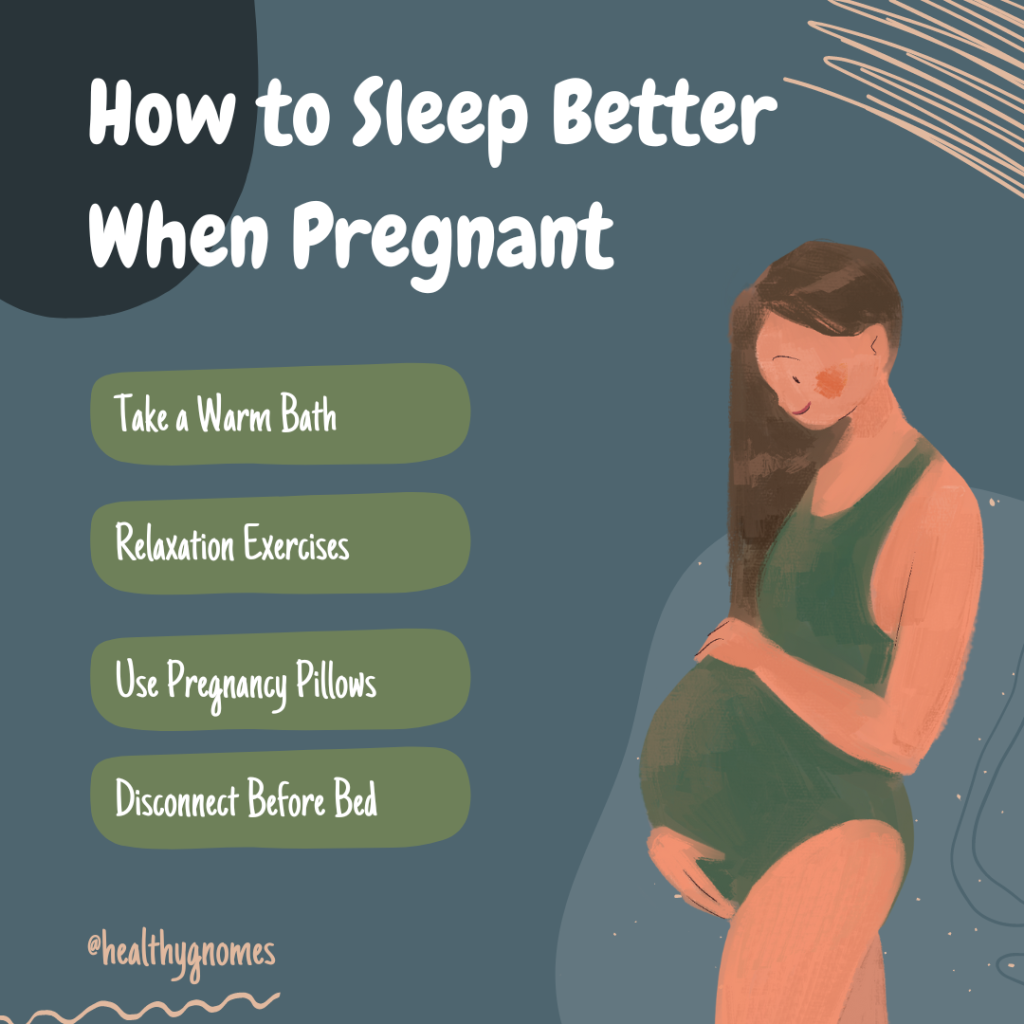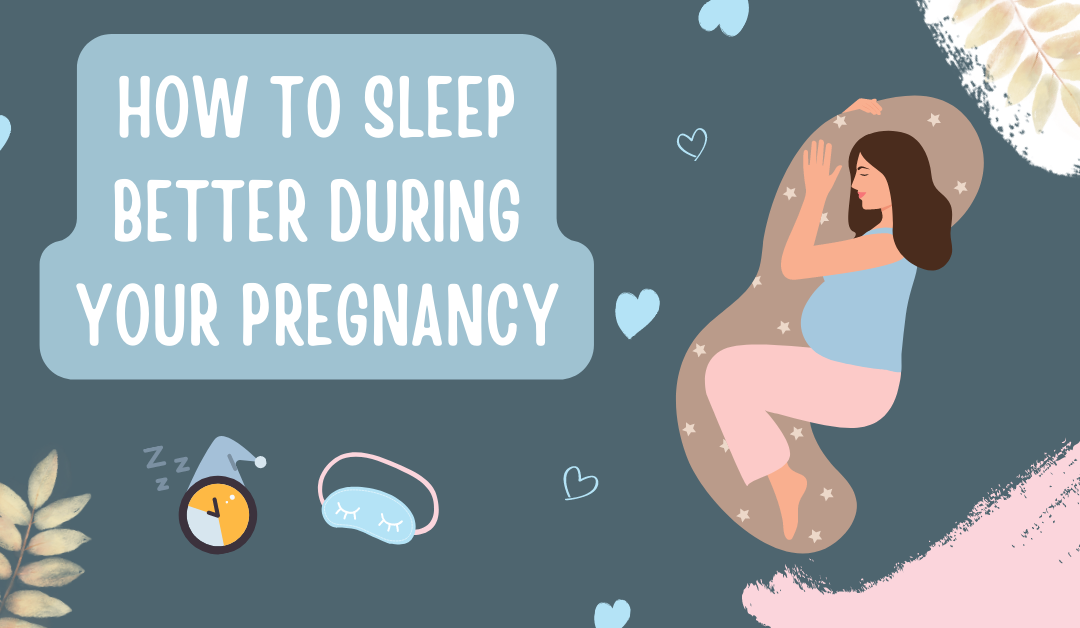Pregnancy takes your body on a wild ride. Your hormones are all over the place, and your body is going through so many changes every day. After all, it takes a lot of hard work and effort to grow a human. But there’s one thing that you may not have been prepared for: poor sleep. If you’re looking for tips on how to sleep better when pregnant, we have you covered.
But first, let’s talk about how much sleep you really need when you’re pregnant.
How Many Hours Should a Pregnant Woman Sleep?
When you’re pregnant, you’re not only eating for two, but you’re also sleeping for two. But how much sleep is enough?
Generally, you should aim for 8-10 hours of sleep during pregnancy. While it may be challenging to reach that goal, it’s important to try.
Inadequate sleep can cause problems down the road. One study found that pregnant people who got less than six hours of sleep were 4.5 times more likely to need a C-section. Their labor was also 10 hours or longer compared to those who got 7 or more hours of sleep.
As important as it may be, anyone who’s been pregnant will tell you that it’s not always easy to get a restful night of sleep.
To help you get a full night of sleep, we’re going to share some helpful tips on how to get better sleep when pregnant.
How To Get Better Sleep When Pregnant
Getting enough sleep in pregnancy can be challenging, especially during the first and third trimesters. Many people experience insomnia in early pregnancy, and in the third trimester, finding a comfortable position can be difficult (not to mention all of the middle-of-the-night bathroom breaks!).
It’s important to talk to your doctor about your disturbed sleep, but we’re going to share some tips that you can use to get more ZZZs now.
Take a Warm Bath
A little relaxation can go a long way in helping you get to sleep and stay asleep. Taking a warm bath before bed can help melt away stress and get into that sleep state of mind.
It’s important to stress the word “warm” here. Baths are generally fine to take during pregnancy as long as the water isn’t too hot (over 100 degrees Fahrenheit). You don’t want to soak in water that will raise your body temperature to above 102.2 degrees Fahrenheit, or 39 degrees Celsius.
So, stick to warm (not overly hot) baths. Play some soothing music, and just relax. If you have the time, try a guided meditation to calm your mind and body before bed.
Practice Relaxation Exercises
There’s so much going on during pregnancy that it can be difficult to relax. You’re excited about the future, but maybe you also have some anxiety about labor. Worries, fears and hormonal changes can make it harder to sleep.
If your mind is all over the place and it’s making it hard to sleep, there are relaxation techniques you can try to get your body and mind ready for bed.
Try these breathing exercises to help calm your mind and get your body into a relaxed state:
- Inhale slowly, pause and exhale slowly. Focus on controlling your breath and the way it feels to breathe in and out.
- As you inhale, feel your ribs expanding and your lungs filling.
- As you exhale, feel your lungs emptying and your naval pushing in towards your spine.
- Repeat for as long as you need or have time for.
Make sure that you’re inhaling and exhaling slowly. Taking quick deep breaths can cause you to hyperventilate.
To set the mood, try lighting an unscented candle and playing soothing music. Or just sit in peace and silence while breathing.
Practice relaxation techniques every evening before bed to help you get into a more relaxed state.
Try a Different Sleep Position
As you reach the third trimester, finding a comfortable position can be tricky. Experts recommend staying off of your back, especially during the third trimester. As the baby grows and your uterus becomes heavier, it can press down on the nerves in your spine as well as the major vein that transports blood from the lower body to the heart.
According to the National Sleep Foundation, pregnant people should sleep on their left side. Sleeping in this position can help improve the flow of blood and nutrients to both the baby and to your heart and kidneys.
But if you have an especially active baby at night, you may need to change positions every so often.
During the first trimester, it’s safe to sleep in any position you like because your uterus is still so small that it shouldn’t interrupt your sleep patterns.
Use Pregnancy Pillows
If you’re having sleepless nights because you can’t get comfortable, pillows may help.
Invest in some extra pillows and place them:
- Between your knees
- Behind your back for support and pain relief
- Under your baby bump
You can use a regular pillow in each of these spots.
Of course, you can also use a body pillow that’s made for pregnancy. These U-shaped pillows make it easy and comfortable to sleep on your side because they cradle you. They wrap around your body to provide support for your back, and you can place the bottom of the pillow between your knees for added hip support.
There are other types of pregnancy pillow shapes, too, like wedges and waist pillows. Find the shape that works best for your body type and comfort level.
Work on Your Sleep Hygiene
Practicing good sleep hygiene is also important during pregnancy. Creating the right environment and mindset is key. Here are some tips to improve your sleep hygiene:
- Keep the room cool and dark at night. Blackout curtains or sleeping masks can help block out light. The ideal room temperature for sleeping, according to experts, is about 65 degrees Fahrenheit.
- Set a consistent bedtime and prioritize sleep. Remember that you need about 8-10 hours of sleep per day, so make it a point to go to bed earlier.
- Take naps earlier in the day so that they don’t interfere with your nighttime sleep.
- Do something relaxing before bed, like read a book, take a bath or practice deep breathing.
- Avoid eating spicy foods or anything too heavy before bed to reduce the risk of acid reflux.
- Exercise regularly (with the okay of your doctor) and earlier in the day.
- Drink plenty of water during the day, but cut back in the evening to minimize bathroom trips.
The most important thing is to be consistent. Create an environment that promotes restful sleep and prioritize rest. Your body is hard at work creating new life, and that takes a lot of energy. So, give your body the much-deserved rest it needs to work its magic.
Eat Bland Snacks
A nighttime snack may help you get to sleep more quickly. But it’s important to make sure that you’re eating the right foods.
Try eating bland snacks and avoid sugary food before bed. It’s also best to avoid snacks that are spicy, fried or caffeinated.
Here are some great before-bed snack ideas:
- A light snack of wheat crackers, low-fat cheese and a few pieces of fruit
- Low-fat yogurt with toast
- Oatmeal or soup
If you’re dealing with morning sickness, bland snacks are ideal. Make sure that your snacks really are snack-sized. Eating too big of a meal before bed may cause indigestion or make it harder to get comfortable and fall asleep.
Disconnect Hours Before Bedtime
One of the best things you can do to improve sleep during pregnancy is to disconnect from your phone and other screens.
Smartphones and computer screens emit blue light, which makes it harder for your body to get ready for sleep. Blue light actually blocks melatonin, the hormone that makes you feel sleepy and regulates your circadian rhythm.
Plus, the bright light from phones and TV screens makes it harder to get into that relaxed state for sleep.
You don’t have to disconnect for the entire evening. Just aim to stop using electronic devices about 30 minutes before bed.

Final Thoughts
Use these tips on how to get better sleep during pregnancy and enjoy more hours of sleep. It’s important to remember that you’re sleeping for two. Lack of sleep will not only affect your mental health but will also affect the health of the baby.
Make sure that you’re getting enough rest at night, and if you’re really struggling with your sleep schedule, talk to your doctor about using a safe sleep aid.
Rene is a creative, little gnome. When she's not diving deep into research on health and wellness, she's spending here time out in nature, growing her homestead, photographing wildlife, doing yoga or enjoying a zen (depending on the day) moment with her fur babies. And on top of all of that, she's a professional writer by day, helping businesses around the world grow.

